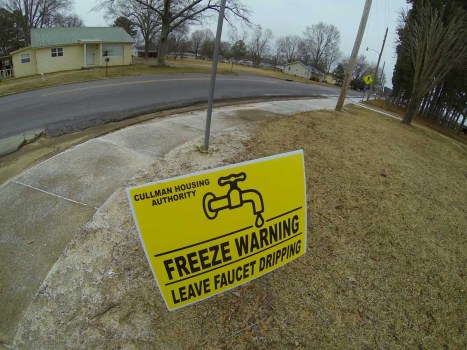Officials prepare for dropping temperatures
Published 4:11 pm Tuesday, January 7, 2025
Local relief coordinators are coordinating to ensure that public warming stations are open across Cullman County, as a sustained winter chill set in Monday, Jan. 6, and is forecast to persist through the remainder of this week.
The Cullman County Emergency Management Agency (EMA), in partnership with the Cullman County Voluntary Organizations Active in Disaster (VOAD), announced Monday openings for warming stations in Cullman, Hanceville, Fairview, Vinemont and Dodge City, with information continually updating on the agencies’ social media platforms.
Shelter locations include:
Vinemont: At the Foot of the Cross Church 2101 Co Rd 1435 Vinemont.
Hanceville: Trinity Pentecostal Church in Hanceville will open as a warming shelter starting Monday. Jan. 6 and will remain available as long as there is a need.
Fairview: Etha Baptist Church in the Fairview area will provide shelter at night beginning Monday and continuing throughout next week for those in need.
Dodge City: The basement of the Dodge City Town Hall will be accessible throughout the weather event. Official ask visitors to treat the space with respect and to keep it clean and orderly.
City of Cullman: The City of Cullman is preparing to open its shelter at the Donald Green Center if deemed necessary throughout the week. Follow on Facebook for updates. If cots are required at any of these locations, the Cullman County EMA will supply them. Participants are encouraged to bring their own personal bedding.
Daytime high temperatures are expected to only barely climb above the freezing mark across north Alabama through at least Saturday, with overnight lows — accompanied by dry weather — forecast to dip into the mid-20s on Wednesday and Thursday evenings. Nighttime temperatures are set to sink even lower as the weekend approaches, when a wave of anticipated winter precipitation moves into the area late Thursday.
Though the forecast could change as the next weather system draws closer, the Huntsville office of the National Weather Service advised on Tuesday that “[c]onfidence is increasing that a winter storm will bring impactful accumulations of snow (and sleet/freezing rain) to the region beginning Thursday night.” Lows are expected to dip into the 15-20 degree range overnight Thursday, accompanied by a “high (70-90%) chance of accumulating winter precipitation” between Thursday night and Saturday morning.
The Cullman County Emergency Management Agency reported no hazardous road conditions associated with the early-week portion of the current cold spell. “However,” EMA advised on Tuesday, “we encourage all residents to remain cautious while traveling, especially in areas prone to freezing, such as bridges and overpasses. If you’re going out during the night, please drive carefully and use caution.”
In addition to monitoring its social media feed on Facebook, EMA advises Cullman County residents to download the Everbridge public safety app to their mobile devices to receive tailored, real-time alerts about weather, road conditions, and emergency notifications. The Everbridge app is available for both Apple iOS and Android devices through the Apple App Store and Google Play.
Follow Cullman County VOAD on Facebook (https://www.facebook.com/CullmanCountyVOAD/) for current information about warming shelter locations, as well as each shelter’s operating policies. Follow the Cullman County EMA on Facebook (https://www.facebook.com/CullmanCountyEMA/) also for shelter information, as well as current weather-related alerts for Cullman County.
The Alabama Department of Public Health is urging the public to know the signs and symptoms of hypothermia and frostbite and take extra precautions during times of extremely cold weather such as those being experienced in the state this week.
According to ADPH, hypothermia “is a medical emergency that can lead to death. Hypothermia occurs when the body’s core temperature falls below 95 degrees F, just a few degrees less than the normal body temperature. When exposed to cold, human bodies begin to lose heat faster than it can be produced.”
Frostbite is an injury most common on exposed skin such as cheeks, nose and ears, but it can also occur on hands and feet. Early warning signs include numbness, loss of feeling or a stinging sensation. If you suspect frostbite, get the person out of the cold immediately and slowly warm the affected area, but do not rub it since that can damage the skin. If numbness continues, seek emergency care.”
Signs and symptoms of hypothermia are as follows:
Adults:
– Shivering
– Exhaustion or feeling very tired
– Confusion
– Fumbling hands
– Memory loss
– Slurred speech
– Drowsiness
Babies:
– Bright red, cold skin
– Very low energy
Frostbite
Any of the following signs may point to frostbite:
– A white or grayish-yellow skin area
– Skin that feels unusually firm or waxy
– Numbness
If unable to get help right away, try to warm the person up.
– Get the person into a warm room or shelter.
– Remove any wet clothing the person is wearing.
– Warm the center of the person’s body — chest, neck, head and groin — using an electric blanket, if available. You can also use skin-to-skin contact under loose, dry layers of blankets, clothing, towels, or sheets.
– Warm drinks can help increase body temperature, but do not give alcoholic drinks. Do not try to give beverages to an unconscious person.
– After body temperature has increased, keep the person dry and wrap their body, including their head and neck, in a warm blanket.
– Get the person proper medical attention as soon as possible.
According to the Centers for Disease Control and Prevention, victims of hypothermia are often:
– Older adults with inadequate food, clothing or heating
– Babies sleeping in cold bedrooms
– People who remain outdoors for long periods—people experiencing homelessness, hikers, hunters and others
– People who drink alcohol or use illicit drugs.
Guidance and graphics about preventing hypothermia and frostbite precautions are available at https://www.cdc.gov/winter-weather/prevention/?CDC_AAref_Val=https://www.cdc.gov/disasters/winter/staysafe/hypothermia.html
Benjamin Bullard can be reached by phone at 256-734-2131 ext. 234.






